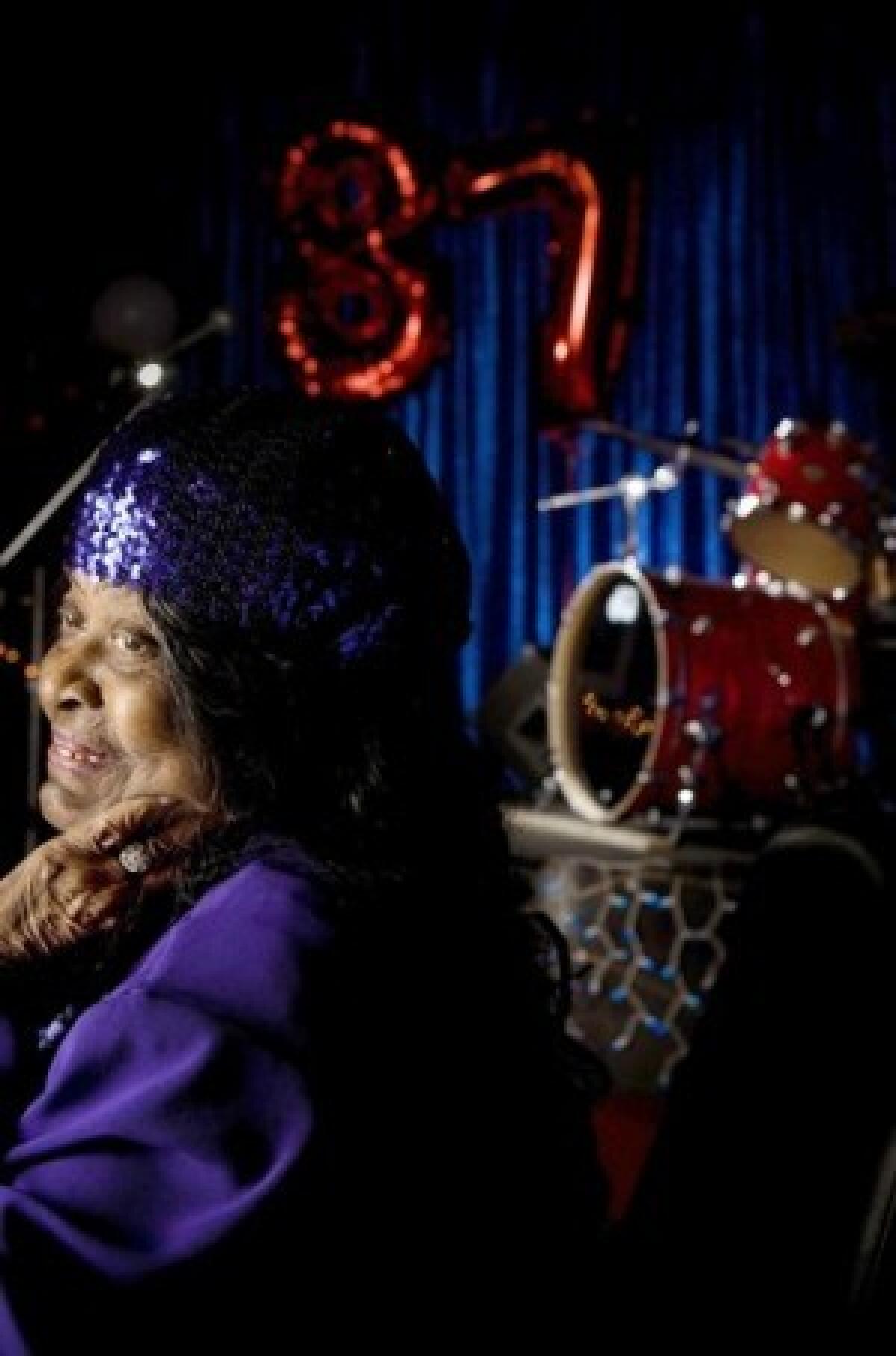Laura Mae Gross dies at 89; club owner

- Share via
Laura Mae Gross, a strong-willed Mississippi woman who came to the West Coast and founded a club that became a staple of Los Angeles’ blues scene, died Saturday of heart failure, according to relatives.
She was 89.
Gross, also known as “Mama,” opened Babe’s and Ricky’s Inn on Central Avenue in 1964 and hosted legends such as Bobby “Blue” Bland and John Lee Hooker while serving cold beer and soda and drawing an integrated crowd.
On Monday nights, often the most popular, a $2 cover also earned patrons a fried chicken dinner.
Babe’s and Ricky’s moved to Leimert Park in 1997 after financial difficulties on Central Avenue, but the vibe stayed the same even when Monday’s cover increased to $10, they started serving wine and the fried chicken dinner plate expanded to a buffet.
The club never made much money, but it earned a reputation as a nurturing ground for young musicians and as a place for the experienced to display their talents.
“The unique thing about that club, and always has been, is you can go down there on jam session night and it didn’t matter if you were a total amateur or a seasoned professional,” bluesman Ray Bailey said. “Everybody gave you the same respect.”
Blues guitarist Keb’ Mo’ said Babe’s and Ricky’s was “the last club from the Central Avenue heyday.”
“It was just a great vibe. It was a real blues club, a true blues club,” he said. “If you were in there and you’d start playing anything but the blues, Mama law would come up to the stage and she would stop you. She’d say: ‘Na, na, na.’ She wasn’t having no Top 40 club.”
Gross was born in Vicksburg, Miss., in 1920 and moved to California about 25 years later with her husband, Riley Gross. He was killed about 10 years later during a robbery as he was cashing a paycheck, family members said.
Gross took over a club near the intersection of Central Avenue and 52nd Street several years later and renamed it Babe’s and Ricky’s Inn after her son and nephew.
When the club opened, the area was already in decline from its perch as the backbone of ballrooms, hotels and theaters that helped define black cultural life in Los Angeles.
“Hers is representative, in an authentic way, of the journey of African Americans in Los Angeles,” county Supervisor Mark Ridley-Thomas said.
“Particularly in Leimert Park, that’s the home of what’s new and what’s next in terms of African American culture and commerce. The arts center of African American life in this region and they punctuated it with the blues.”
The county Board of Supervisors will adjourn in Gross’ memory today.
In the early 1990s the American Society of Composers, Authors and Publishers, which uses copyright laws to monitor and collect royalties for its members, said Gross failed to pay fees on music performances at the club on Central Avenue, and she later faced a default judgment of nearly $9,000.
At the time, she told a reporter from The Times, “They can’t get blood from a turnip.”
“I have nothing,” Gross said in 1993. “I had $300 in my checking account, and they took that.”
After seeing the story in The Times, the legendary songwriting team of Jerry Leiber and Mike Stoller agreed to pay off the debt. Both went to high school in Los Angeles in the early 1950s and were students of the Central Avenue night life. They wrote “Jailhouse Rock,” recorded by Elvis Presley, among other hits.
Gross was evicted from the Central Avenue location in 1996 after her landlords tripled her rent. She reopened in Leimert Park in the Crenshaw district with the help of Hodges and Ridley-Thomas, who was then a city councilman.
“I’m back!” Gross exclaimed during the opening.
Her son, Ronald Smith, lives in New York but said he wants the club to stay open.
“She taught me how to appreciate music and how to deal with different people and different personalities. . . . It was a beautiful thing for me,” Smith said.
He said his mother is also survived by three granddaughters and two great-grandchildren.
Jonathan Hodges, a property master for movies and TV shows, who was Gross’ partner in Leimert Park, said the club had a birthday party for Gross just a few weeks ago.
It was the first year she wasn’t able to attend. She soon entered a hospice.
“There was an aura of authenticity that she had that made it so you always heard blues -- real blues music -- in that club, whether it was good or bad, because it varied,” Hodges said.
“She’s immensely respected by people for that,” he said.
Friends said that even though she was turning 89, the party was dubbed her 90th.
Fundraisers for Gross’ funeral services will be held Friday and Saturday at the club.
A public viewing will be held at Inglewood Cemetery Mortuary from 3 to 8 p.m. Oct. 16.
Funeral services will be at 1 p.m. Oct. 17 at the Golden West Mausoleum, also known as the Galleria, at Inglewood Park Cemetery, 720 East Florence Ave.
More to Read
Start your day right
Sign up for Essential California for the L.A. Times biggest news, features and recommendations in your inbox six days a week.
You may occasionally receive promotional content from the Los Angeles Times.






